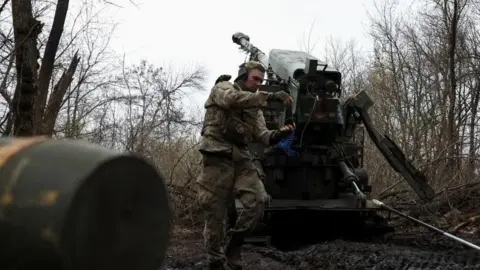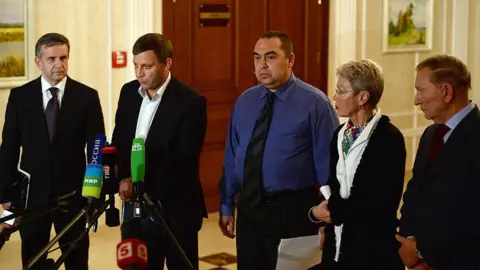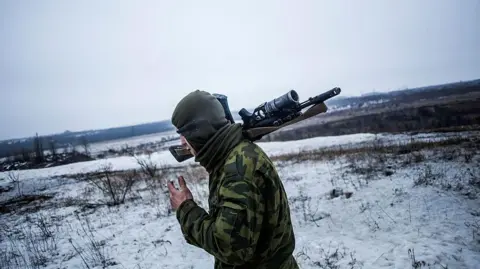BBC Monitoring Russia editor
 Reuters
ReutersRussia’s ceasefire in Ukraine lasted solely 30 hours, and even then it seems to have been very restricted in scope, with accusations of violations on each side.
Kyiv mentioned there had been no “air raids alerts” on Sunday throughout Vladimir Putin’s “Easter truce” and President Volodymyr Zelensky steered this may very well be the “best” format to increase for 30 days and presumably extra.
The US had tried to organise a 30-day ceasefire however that by no means took maintain, and this newest chapter underscores the problem in reaching even a quick pause in combating,
Russia insisted on a variety of situations, together with a halt to Ukraine re-arming and recruiting new fighters in addition to “underlying causes of the battle”.
One main issue hampering the talks’ progress is the lengthy historical past of damaged ceasefire offers, leading to deep distrust between the 2 neighbours.
Throughout his tempestuous assembly with Donald Trump in February, Zelensky accused Russia of violating 25 ceasefire agreements since 2014, and argued that no such deal would maintain with out safety ensures.
In flip, Russia accuses the Ukrainian president of being “incapable” of implementing any such agreements.
Unbiased specialists say Russia bears the brunt of the blame for damaged truces, although Ukraine bears some accountability, too.
Statements by present and former Russian officers additionally point out that Moscow could be ready to stop hostilities, provided that its unique aims are achieved – particularly a demilitarised, impartial and non-nuclear Ukraine.
Distrust dates again to Russia’s 2014 invasion
By invading Ukraine in 2014, Russia violated the Settlement on Friendship, Cooperation and Partnership between the 2 nations signed in 1997. Article 2 mentioned the perimeters “respect one another’s territorial integrity and ensure the inviolability of present borders between them”.
The warfare has been rife with accusations of treachery from the very starting.
Gen Viktor Muzhenko, the chief of Ukraine’s Basic Employees on the time, accuses Russia of going again on agreements permitting Ukrainian troops to tug out from the japanese city of Ilovaysk in August 2014.
In consequence, withdrawing convoys got here underneath hearth, and a minimum of 366 Ukrainian fighters had been killed.
Minsk agreements signed and damaged
 VASILY MAXIMOV/AFP
VASILY MAXIMOV/AFPThe primary main ceasefire settlement, signed on 5 September 2014 in Minsk, was damaged inside hours of being signed, with Ukrainian sources reporting assaults by Russian proxy forces on Donetsk airport. Assaults on different Ukrainian cities within the area, corresponding to Debaltseve, continued, too.
This prompted the second tried truce, often called Minsk-2, nevertheless it was even shorter.
Inside minutes of it going into impact on 15 February 2015, observers from the Organisation for Safety and Cooperation in Europe (OSCE) reported mortar and artillery hearth in Donetsk. They had been deployed to the warfare zone at Ukraine’s request to observe the safety state of affairs together with any ceasefire violations, however they didn’t explicitly say who dedicated them.
What adopted was a string of different failed ceasefire makes an attempt. Once more, some had been damaged inside minutes of coming into drive.
They included Easter truces in 2016, 2017 and 2018, the “faculty ceasefires” of 2015, 2016, 2017 and 2018 which had been meant to permit schoolchildren close to the frontline to return to high school in September, Christmas and New 12 months ceasefires in 2015, 2016, 2017 and 2018, and the “bread ceasefires” of 2017, 2018 and 2019 to permit the harvesting of grain, and others.
A “complete ceasefire” that went into impact on 27 July 2020 solely lasted 20 minutes, in keeping with Kyiv. Nonetheless, it had an impact on the combating, halving the variety of fatalities amongst Ukrainian troopers within the following 12 months.
Who’s accountable?
Matthew Savill, director of navy sciences on the Royal United Providers Institute (RUSI) in London, argues that Russia has by no means entered ceasefire talks in good religion.
“Russia has by no means been honest about eradicating or ending the chance of the usage of drive in searching for its aims,” he says.
Due to numerous ceasefire agreements between Ukraine and Russia, “the extent of combating has ebbed and flowed, and Ukraine bears some accountability for a part of that”, he tells the BBC.
“However the underlying problem has been that there has all the time been a Russian or Russian-backed navy menace, and that informs issues.”
John Herbst, a former US ambassador to Kyiv who now works for the Washington-based think-tank Atlantic Council, argues that Russia, not Ukraine was the “serial violator” of the Minsk ceasefire accords, the primary and nonetheless probably the most complete makes an attempt to dealer a truce in Ukraine.
Verifying claims of ceasefire violations isn’t simple as a result of virtually all impartial journalists are banned from Russian-controlled elements of Ukraine.
BBC journalist Olga Ivshina, who was on the bottom in Ukraine’s japanese Donbas area reporting concerning the earlier levels of the warfare, says there have been stories of Ukraine retaking villages in 2016-19, a profitable Ukrainian offensive outdoors Mariupol, and Ukrainian tanks had been noticed too near the frontline, the place they need to not have been underneath the ceasefire offers.
“All of those had been proclaimed as violations by Moscow. However after all they forgot to say that their seize of Debaltseve in 2015 was the most important violation of all,” Ivshina says.
 Getty Photographs
Getty PhotographsRegardless of the Minsk accords, Russian-controlled forces launched an offensive towards the city of Debaltseve, claiming that it was not coated by the ceasefire deal.
Zelensky has described the Minsk accords as a “lure” for Ukraine which allowed Russia to arrange for the full-scale invasion.
Putin says neither Ukraine nor its Western backers had supposed to implement the Minsk offers. Their destiny was sealed when Russia declared the so-called Donetsk and Luhansk “individuals’s republics” – separatist entities it had helped to arrange – as impartial states.
What subsequent?
Putin’s “Easter truce” was by no means greater than a lull, however President Trump mentioned “hopefully Russia and Ukraine will make a deal this week”.
To this point there was no indication that the Kremlin will settle for the US name for a direct and unconditional ceasefire, agreed to by Ukraine.
Trump has already warned that if both social gathering makes ceasefire talks tough, “we’re simply gonna take a cross” and stroll away.
Russia’s demand for “the underlying causes of the battle” to be resolved counsel it has not moved from its unique goal of undermining Ukraine’s sovereignty – via negotiations in addition to navy means.
Vladislav Surkov, a former shut adviser to Vladimir Putin who was often called the “gray cardinal” of Russian politics, celebrates the Minsk accords final 12 months as a approach of “legitimising” Ukraine’s preliminary partition.
The very concept of peace, he mentioned, wass “nothing however a continuation of warfare by different means”.


